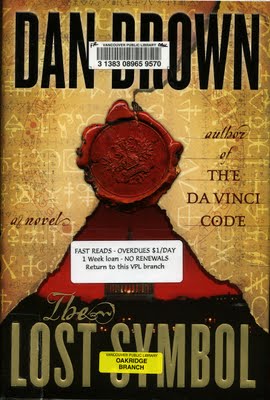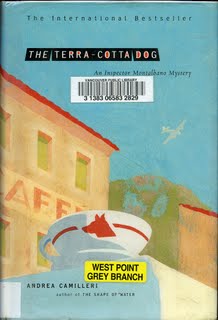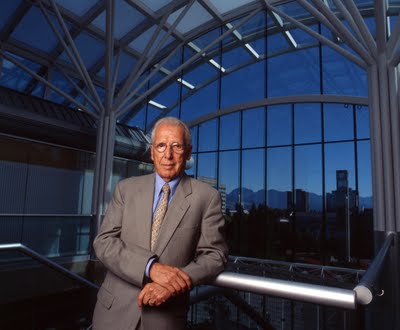The Palest Ink & The Limitless Real Estate Of the Web
Sunday, September 27, 2009
The palest ink is better than the most retentive memory.
Chinese proverb.
That wich the men of old and of modern times conceived in their learned souls is free for the inspection of those who would read.
Ovid, from his Tristia

Eight years ago I did some work for the UBC Trek Magazine and dealt with the most pleasant editor of the time. His name was Chris Petty. They paid photographers well and they paid writers one dollar per word. That was rare then and now it strikes me as literary science fiction. I told him that I had had some pleasant experience using the UBC Library and that I was prepared to write something on the subject for that lofty one dollar per page. I wrote an essay on libraries and their origin and from there went to write about the UBC libraries. Petty was vaguely dismissive and wrote me something like, “This was not what I was expecting.” I left it at that and filed it away. It seems that the article I did write was one in which I used an old Smith Corona word processor, PWP-40 that used a smallish proprietary type of floppy disc that was not compatible with PCs. Only a week ago I threw away the PWP-40.
I have been thinking about libraries again (I will explain below) so I went to my photo files and found Libraries. To my mild horror the manuscript of the piece I wrote for Trek is missing some pages. And the disc that I have of the article cannot be opened now. So I will use what I found to write today’s blog about libraries and my newly re-discovered interest in them.
If this blog is too long ( I read recenty in the NY Times the statement: Space in print is limited, in the web the reale state is limitless.) you could read the first part (why it is libraries are on my mind) and skip the second part which is a brief history of lending libraries with an emphasis on the UBC Library.
At age 67 the full bookcases and the stacks of books I have on my living room floor produce a deep anxiety. Do I need all my books? Will I ever re-read any of them (this I do with frequency)? Where can I find a home for them that will ameliorate the pain of giving them away? I have been very careful when I buy the books that I do buy. Besides their expense (I find bargains in the remainder section of Chapters) I feel guilty about adding to the piles at home.
In the last recent months I have been going to the VPL with frequency searching for the right spoken books to copy so that I can send them to Inesita my godmother and first cousin (she is 86) in Argentina who has poor sight but wants to continue reading in English. She is choosey about what she reads. She has the same highbrowish taste my mother had. There are quite a few people that say that copying a spoken book to send to BA for personal use is no different from lending a library book to a friend (with the stipulation it be returned promptly!) This week I hit pay dirt at both my nearby Kerrisdale Branch and the Oakridge Branch.
I found:
A Certain Justice, P.D. James
Lives of Girls and Women, Alice Munro
Passion and Artemisia, Susan Vreeland
The Piano Man’s Daughter, Timothy Findley
The Glace Bay Miner’s Museum, Sheldon Currie
The No. 1 Ladies’Detective Agency, Alexander McCall Smith
AND! The Year of Magical Thinking, Joan Didion
My cousin Inesita listens to the books I send her twice per month and gets much pleasure. I feel very good about doing it. It is perhaps because of this that I have come to understand the value of the library and how we take libraries so much for granted. This awareness hit me almost like a blow in the face when I saw at the Oakridge Branch in their Fast Reads section Dan Brown’s The Lost Symbol. I would not be caught dead spending money to buy this sort of thing. I did read the Da Vinci Code when it first came out and Rosemary, Rebecca and I saw the film in our hotel in Mérida two years ago (to the disapproval of Rebecca’s mother Hilary, my daughter!). So I took out the book and I am enjoying it without too much guilt.

The other book I found helps to remove all that guilt of no longer wishing to buying a book I want to read now. My neighbour Patricia Hutter has borrowed all of my Dona Leon novels featuring a suave and erudite Venetian police inspector called Brunetti. Then she lent me one written by Andrea Camilleri. I was hooked so she lent me the other two she had which are all about Flavio Montalbano a Sicilian police inspector with Epicurean sensibilities. I have done my best to not consider going to Chapters to buy the rest. There, at the Kerridale branch I spotted those telltale pastel colours of the series! I happily brought it home.
I am ready now to buy fewer books and to take advantage of the excellent library system our city has for us.
Libraries
In January 1998 I hopped on a bus to the University of British Columbia and became a member of the UBC Library. At the Walter C. Koerner I borrowed the complete works of Cuban writer Alejo Carpentier in Spanish and bought a hot dog outside. I managed to get home on the transfer, not before buying for $3.00, from a bargain bin of the UBC Bookstore , a pristine first edition of Andrew Miller’s remarkable novel Ingenious Pain.
I had been at the Koerner two years before. Arthur Erickson, the library’s architect, had posed for my camera on the top floor. He had shown up in a beautiful gray suit that matched the concrete and metal he so intimately knew. Behind him we could se the old Main Library. Erickson had built the Koerner with that view, and another, in mind. Behind me was Howe Sound.

UBC was incorporated in 1908 but the library did not open until 1915 in two rooms of the new tuberculosis wing of the Vancouver General Hospital. The first university library, the Sorbonne, opened in 1250, when the king’s chaplain, Robert de Sorbonne established a residence for theology students of slim resources.
The first university library I ever used was at the University of Texas at Austin during the early 60s. It was then fashionable to sneak a few six-packs of Pearl Beer and a date to the observation deck of the library tower. Nobody had yet thought about bringing up guns.
In spite of having the best codex and manuscript, second only to Seville’s, on the European discovery and conquest of he New World, the library also served another less-learned purpose. During football season it would be brilliantly lit at night to signal a Texas Longhorns victory. This is the case today. While I may have had to sneak in at Austin to the library observation deck, at UBC they had other restrictions. It was only in 196 that first and second year students were finally allowed access to the stacks before 6pm.
My lifelong attraction to libraries began with a bomb. In 1948 the US Information Service Lincoln Library on Calle Florida in Buenos Aires was bombed. On its blackened walls protesters painted, “Imperialistas Yankees Fuera (out) de la Argentina”. When the explosive went off outside I was inside checking out Curious George. I was 7. In spite of the scare, I returned to the library many times and in 1952, when my family moved to Mexico I became a member of the Benjamin Franklin, the Lincoln’s equivalent in Mexico City. It was popular with the engineering students as the library was the only on that hand American technical journals and periodicals. While there were well-founded rumours that these libraries were CIA fronts, I was never approached by any spooks. But a spook may have been involved in the early history of the UBC Library. In 1914 when J.T. Gerould was appointed to buy a basic collection for the library for the newly incorporated UBC he purchased 20,000 books in England and in France. In Leipzig he was locked up for three years, accused of being a British Spy.
The USIS libraries as opposed to most others in Latin America are unique in that you can take books home. The concept of a circulating library is a relatively recent phenomenon. Canadians take for granted a steady 110 voltage, and unwavering 60 cycles. They take for granted being able to bring home a library book. Not only is this normal but it would also seem a God-given right. My Argentine relatives refuse to believe that my Felix the Cat wall clock tells correct time in spite of being plugged in to an outlet. I wouldn’t ever try to explain that here I can not only take out books and spoken books but also films on DVDs from the public library.
The first tax-supported public library opened in Peterborough, New Hampshire in 1833. Before that there were subscription libraries where members, who not only paid dues but had to buy shares, could take books home. On such library, the Library Company of Philadelphia, founded by Benjamin Franklin in 1732 made the librarian responsible for any lost books. Andrew Carnegie, who gave away more than $65 million for public libraries in the United States alone and not counting the money given to his native Scotland, the British Empire and Vancouver, popularized the concept of stipulating that the money given hinged on the municipality of the city setting aside funds for their upkeep. In 1932 during the Great Depression a Carnegie grant of $15,000 tidied over the UBC Library so that by 1936 it had 100, 000 volumes.
Paradoxically while Juan Perón’s henchmen burned books from Buenos Aires Catholic churches in the early 50s it was also Perón who inculcated in young school children the idea that books were valuable and should be taken care of. We were instructed to never write anything in them besides our name. It is interesting that when Erasmus borrowed two manuscripts in 1443 from the Dominicans at Basle he returned them covered with red pencil marks.
Books have always been valuable and only the cheap pocket editions that US soldiers read during WWII ushered the era of affordable books. When professor Michaelis of Gottingen asked for the use of a Hebrew bible condex form Casse in 1767, the Landgrave, Duke Charles Eugen of Wurttemberg granted him permission but had the manuscript brought to Gottinhen under the protection of hussars.
USIS Library “indoctrination” led me to an early appreciation in reading books in English and in particular those by American authors. It all changed in 1989 when I got to the third chapter of Stephen King’s The Tommyknockers and was turned off by the concept of a mass frenzy to buy Tampax at the novel’s small-town drugstore by its female inhabitants. I decided then and there that I would seek out other literature.
Newspaper articles on Peruvian author Mario Vargas Llosa’s run as a candidate for his country’s presidency awakened an interest in his books. This led to other Latin American and Spanish authors, Gabriel García Marquez, Álvaro Mutis, Jorge Luís Borges, Jorge Amado, Homero Aridjis, Carlos Fuentes, Nicolás Guillén and many more. Some of the books were available in Spanish at the now closed Manhattan Book Store and its present day version, Sophia Books. But hardcover and even paperback books imported from Spain or Mexico command a stiff price so I had come to depend on the Vancouver Public Library’s good but small collection of contemporary Latin American literature in Spanish.
It was sometime around 1998 when my search for Jorge Amado’s Dona Flor and Her Two Husbands (in any language) got me nowhere until I tried the UBC Library’s web page. While I have never considered the VPL’s on line stack’s search is that user friendly (it has vastly improved) I was amazed at how good UBC’s was. In short order I located an edition in English and one in Portuguese which were at the Main Library. I keyed in the out-of-print Concierto Barroco by Alejo Carpentier and was rewarded with the information that the library had Carpentier’s entire literary output. When I explored the stacks of Latin American Lit at the Koerner I could sense the hand of UBC professor George McWhirter (the recent Vancouver Poet Laureate) who has translated from Spanish into English the poetry of my favourite Mexican novelist, Homero Aridjis. Most of his works were there and in Spanish.
The UBC Library is made up of 10 libraries on campus and 4 off campus. I recently noted that while the Education Library does not have children’s books in Spanish (unlike the VPL) it does have a nice variety that made my granddaughter Rebecca happy.
On any given day you can be assured that if you trek to the UBC Library that it will be open on schedule unlike the main branch of the VPL which may close on certain Sundays or when movies are being made on location. Ammianus Marchellinus, a Latin historian in 78 A.D. wrote:
Byblothecis sepulchrus ritu in perpetumm clausis.
He would have approved of UBC's library as it certainly is not closed forever like a tomb.






